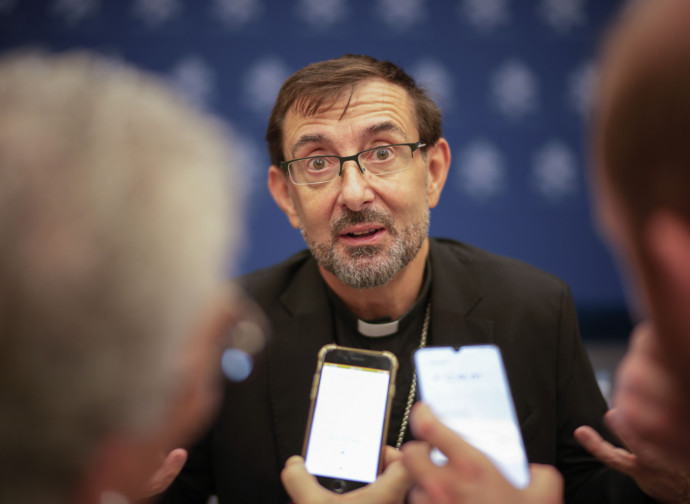Pro- LGBT Cardinal Cobo divides Spanish Church
The Cardinal of Madrid bows to the LGBT lobby. The Bishop of Orihuela-Alicante reiterates Catholic doctrine. Confusion is fuelled by Fiducia Supplicans, leading down the failed path of embracing the secularised world.

Even the late Pope Francis spoke out several times against the 'whims' of gender ideology and transgenderism, labelling them anti-human 'ideological colonisation' contrary to God's plan. However, one of his trusted followers, Cardinal José Cobo Cano, the Metropolitan Archbishop of Madrid since 12 June 2023, does not agree. Nonetheless, even in Spain, there are prelates who defend the Gospel of Christ and the doctrine of the Church.
Madrid recently became the capital of LGBTQI+ Christians when the Assembly of the Global Network of Rainbow Catholics (GNRC) met there from 21 to 25 August. In this context, Cardinal José Cobo's voice resounded strongly and clearly in favour of LGBTQI+ Christians. In a letter sent to the ecumenical vigil held at the Hermitage of the Virgen del Puerto, the Spanish prelate stated that the Church is opening its doors to become increasingly 'welcoming and fraternal', and to embrace respect and compassion. This message was accurately reported by one of the leading web portals for LGBTQI+ Christian ecumenical organisations, the Revista Rainbow portal. The portal acknowledges that Cardinal Cobo recognises that the Church still has a long way to go in its relationship with the LGBTQ+ community, and also stresses the need for new pastoral approaches: 'opening new doors and new ways of accompanying'. This message was well received because it followed the 'warm and enriching' meeting with representatives of the Crismhom Association in Madrid on 22 July.
Thanks to the Cardinal of Madrid's openness, this world assembly is being held in Spain for the first time, demanding that 'LGBTQ rights are human rights' and urging the Church not to remain on the sidelines in the face of this reality. The co-presidents of the GNRC, Marianne Duddy-Burke and Christopher Vella, emphasised the urgency of creating paths of justice and welcome. Theologians such as María Luisa Berzosa and Cristina Inogés also recalled that the Gospel calls us to include those who have been historically marginalised because 'Christ is risen for all'. While this is obvious, it does not eliminate judgement of the morality of behaviour or the distortion of a doctrine that is contrary to God's plan and harmful to human growth. Nevertheless, when reiterating their claims, those same pseudo-Christian and pseudo-Catholic groups had already petitioned the Catholic Church in Madrid and Rome in August 2022 to ask forgiveness for not supporting and recognising their LGBTQI+ lifestyle choices as positive and fulfilling.
However, Cardinal Cobo has not found the time, either in July or recently, to reaffirm the doctrine, catechism, or warnings about the dangers of gender ideology, LGBTQI+ practices, and privileges. In fact, we must add that the prelate of Madrid's gestures are part of a broader agenda, a remnant of the clique linked to the previous pontiff which is still very much present among the people, in the dicasteries, and in the whispers of the Vatican chambers. We cannot forget the 'Jubilee for People with Different Sexual Orientations', scheduled to take place in Rome in a week's time. Cardinal Cobo himself hopes that it will be a new milestone in the history of inclusion within Catholicism.
Inclusion of whom or what? LGBTQI+ people who want to repent for unnatural acts far from the Gospel of Christ, or LGBTQI+ privilege promoters who support ideological colonisation and seek to distort God the Creator's plan? Or is it to pander to the LGBTQI+ world's demand to change doctrine and interpret biblical divine creation contrary to its literal meaning and tradition?
The Bishop of Orihuela-Alicante, Monsignor José Ignacio Munilla Aguirre, set the record straight by pointing out a difference. During his catechetical reflection on the global Catholic television network EWTN on 28 August, he recalled Pope Francis's famous words, 'If a person is gay and seeks the Lord and has good will, who am I to judge him?', but pointed out that the Holy Father was referring explicitly to the Catechism of the Catholic Church and distinguishing between homosexual orientation and membership of a lobby with specific ideological interests.
In accordance with the magisterium, Monsignor Munilla then denounced the existence of a 'gay lobby', which he said 'imposes a gender ideology as the only form of thought' and 'even attempts to prevent the Church's freedom to preach its moral message'.
Finally, Munilla analysed paragraphs 2357, 2358 and 2359 of the Catechism of the Catholic Church much more correctly than the 'prince of the Church' Cobo. These paragraphs set out the Church's teaching on homosexuality. Munilla emphasised that the Church does not use the term LGBT, which it considers to be representative of a specific ideology. Instead, it speaks of 'persons with homosexual tendencies'. He explained that this distinction is essential in order to avoid identifying individuals with a group that promotes an alternative view of humanity.
These two positions — one falsely accommodating and the other truthful — indicate a permanent and serious situation of confusion that has been deliberately created and exploited within the Church of Christ. This situation has been exacerbated by the publication of Fiducia Supplicans (see our dossier), certain performances and colourful statements by synod fathers, and the subsequent notes and responses to doubts about the text issued by the Congregation for the Doctrine of the Faith, which is still headed by Cardinal Víctor Manuel Fernández. We should not allow schism and heresy to take root as they have in Germany, where the Church is becoming increasingly divided and its members are leaving in droves, as always happens when the Church compromises on the truth by adopting the secularised views of the modern world.
